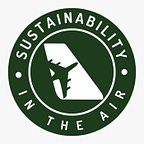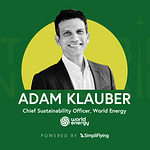In this episode of our ‘Sustainability in the Air’ podcast, Andrew Chen, Principal for Aviation Decarbonisation at RMI, speaks with SimpliFlying CEO Shashank Nigam and shares the RMI’s multi-faceted approach to aviation decarbonisation.
Founded in 1982 as Rocky Mountain Institute, RMI is an independent, non-partisan, non-profit that seeks to transform the global energy system to ensure a clean, zero-carbon future. RMI seeks to decarbonise energy systems through rapid, market-based change. They work closely with businesses, policymakers and communities to identify and scale requisite energy system interventions to cut greenhouse gas emissions by at least 50% by 2030.
Here are the key highlights of the conversation:
How the RMI is accelerating net zero aviation (2:00)
The Contrail Impact Taskforce (6:20)
The Sustainable Aviation Buyers Alliance (SABA) (14:40)
Preventing double counting in SAF certificates (20:20)
The pivotal role of financial institutions in decarbonising aviation (28:30)
Sustainable Aviation Fuel (SAF) vs Low Carbon Aviation Fuel (LCAF) (42:00)
Aviation’s non-CO2 impacts and potential solutions (45:00)
Rapid Fire! (59:50)
Keep reading for a quick overview of the episode
Why RMI’s Contrail Impact Taskforce matters
In 2022, RMI and Breakthrough Energy spearheaded the formation of the Contrail Impact Task Force, in collaboration with major airlines such as Alaska Airlines, American Airlines, and Virgin Atlantic, as well as industry giants Airbus, Boeing, Google Research, and Imperial College London.
Contrails, or condensation trails, are long, streaky clouds that often form behind an airplane in cold and humid conditions when water vapour freezes around small dust and soot particles from the engine. Although they look harmless, contrails are made up of small ice crystals that trap heat in the earth’s atmosphere and contribute to global warming. One study found that contrails cause 57% of aviation’s warming impact. Another report by the IPCC in 2022 noted that contrails account for roughly 35% of the warming impact.
The Contrail Impact Task Force seeks to mitigate the climate impact of aviation contrails through a comprehensive approach that involves sharing scientific insights on contrails and developing practical strategies to avoid warming contrails, while also tackling the operational and financial challenges of implementing potential solutions.
The task force also aims to integrate contrail prediction tools into existing flight planning platforms. Further, the contrail predictive model will undergo continuous improvement by verification of contrail formation through advanced satellite imagery and other data sources. Additionally, the task force will examine the implications of route adjustments on fuel consumption and the role of sustainable aviation fuel (SAF) in contrail mitigation.
5 ways RMI is advancing aviation decarbonisation
1. Sustainable Aviation Buyers Alliance
In 2021, the RMI founded the Sustainable Aviation Buyers Alliance (SABA) in partnership with the Environmental Defense Fund, aiming to accelerate net-zero aviation by catalysing investment in high-integrity SAF. Despite SAF’s capability to cut the carbon intensity of aviation by over 80%, its utilisation remains below 0.1% of the global aviation fuel supply. SABA seeks to address the existing “green premium” on SAF, which poses significant financial challenges for airlines.
To tackle this, SABA leverages corporate demand from large businesses like Microsoft, Disney, Deloitte, and McKinsey & Company, that have substantial air travel footprints and want to reduce their Scope 3 carbon emissions. By aggregating demand and conducting Request for Proposals (RFPs), SABA negotiates SAF certificate (SAFc) purchases for its customers, facilitating long-term offtake agreements and encouraging the production and use of SAF.
(SAF certificates enable airlines and corporate customers without physical access to SAF to claim its environmental benefits, incentivising investment in new SAF supply.)
2. Blockchain-based SAF Certificate Registry – prevent double counting
To further bolster transparency and promote the use of SAF, the RMI and the Energy Web Foundation launched the blockchain-based digital SAFc Registry at COP28 in December 2023. By facilitating the issuance, transfer, and retirement of SAFc, the registry aims to democratise access to the environmental benefits of SAF, encouraging a broader supply.
By adopting an open-source model, this digital registry also seeks to demonstrate the potential of technology to foster transparency and accountability within complex supply chains. Since it is blockchain-based, the SAF registry records every SAF transaction on a secure, decentralised digital ledger, visible to all. This system ensures that SAF production, sales, and usage are transparent and verifiable, enhancing trust and accountability in the market. The registry will function as a key tool in driving the market towards higher-quality fuel by offering comprehensive data on the environmental quality and certifications of SAF, thereby enabling aviation customers to make informed, sustainable choices.
3. The pivotal role of financial institutions
Chen elucidates the critical influence of financial institutions in propelling the aviation sector towards a greener future.
He states that a sustainable transition by 2050 would require nearly $175 billion worth of investment each year. This underscores not only the necessity for substantial capital investment but also the critical role of government policies and incentives in mobilising resources. The transition to a green future, therefore, requires a close collaboration between finance, policy, and sustainability.
In 2020, the RMI established the Aviation Climate-Aligned Finance Working Group to guide asset managers and lessors in aligning their investments with net-zero objectives. With deep partnerships in finance, industry, government, and civil society, the Center works to develop decarbonisation agreements within high-emitting sectors, build global frameworks for climate alignment, and support financial institutions in decarbonising their lending and investing portfolios.
4. Life cycle savings – SAF versus LCAFs
Chen asserts a preference for SAF over Low Carbon Aviation Fuel (LCAF), underscoring the importance and necessity of investing in fuels with higher life cycle savings. While LCAF offers a minimum of 10% savings in carbon emissions over its lifecycle, SAF typically provides much greater reductions, with certain standards and definitions aiming for at least a 50% reduction. Currently, SABA has set a benchmark of a 60% reduction to ensure more substantial environmental benefits.
Chen also highlights the potential of SAF, particularly those derived from biofuels like used cooking oil or tallow, to achieve savings of about 75%-80%, and even up to 99% for future fuels produced from renewable electricity, captured carbon, and green hydrogen. Since SAF offers greater potential reductions in the carbon intensity of aviation fuel, it is a more impactful choice for decarbonising the aviation industry compared to LCAF, he adds.
5. Shared Responsibility for Decarbonising Aviation
Chen emphasises the collective responsibility of all stakeholders in the aviation industry's transition towards sustainability, highlighting that no single entity can bear the cost of decarbonisation alone. Given the airlines’ slim profit margins, passing these additional costs directly to them could threaten their financial viability, he adds.
Chen suggests that corporate travellers play a crucial role in decarbonising aviation due to their substantial travel needs and ambitious climate targets. He advocates for leveraging the financial capabilities and sustainability commitments of corporate entities to support the transition to SAF. In addition, initiatives like SABA can facilitate a more sustainable future for air travel.
‘Sustainability in the Air’ is the world’s leading podcast dedicated to sustainable aviation. Through in-depth conversations with top aviation leaders, we break through the clutter and provide a clear roadmap for a net-zero future.













